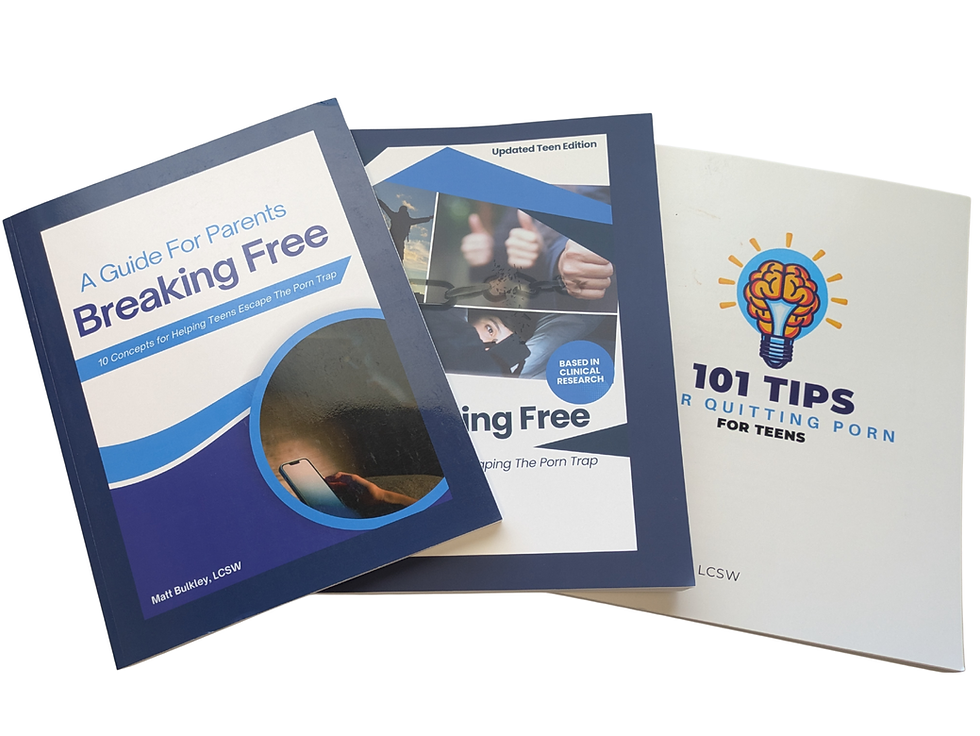Helping Your Teen Break Free from Pornography Addiction: A Guide for Parents
- Matt Bulkley

- Jun 15
- 3 min read
Updated: Jun 18
As a parent, learning that your teen is struggling with pornography addiction can feel overwhelming. You may experience a mix of worry, confusion, or even frustration, but know this: you’re not alone, and there’s hope. The Breaking Free workbook, originally released in 2010 and now updated for 2025 with the latest research and clinical insights, offers a powerful, structured approach to help teens overcome this challenge. Its companion parent workbook, Supporting Your Teen’s Recovery from Pornography Addiction, equips you with the tools to guide your teen toward healing with empathy and intention. Here’s what you need to know to support your teen on this journey.
Understanding the Struggle
Today’s teens face a world saturated with explicit content—accessible 24/7 through smartphones, social media, and apps like TikTok. Pornography addiction often stems from curiosity, stress, or unmet emotional needs, and it doesn’t discriminate. Even high-achieving teens with big dreams can fall into its grip, leading to issues like low self-esteem, strained relationships, and declining grades. Early warning signs include secretive behavior, excessive screen time, or withdrawal from family and friends. Recognizing these red flags allows you to step in with care and purpose.
The Breaking Free Approach
The Breaking Free teen workbook is a lifeline for teens already caught in the cycle of addiction. It’s not about prevention alone but about breaking free from compulsive behaviors. The workbook is grounded in a clear stance: pornography, in all its forms, is harmful, and sex is sacred, meant for marriage. It combines evidence-based strategies like cognitive-behavioral techniques with spiritual guidance, encouraging teens to lean on faith, trusted adults, and professional support. The workbook is split into two parts with 10 core concepts, offering tough but practical assignments, a relapse tracker, and recovery tips. It also integrates the Twelve Steps, a time-tested spiritual framework for overcoming addiction.
For parents, the companion workbook aligns with the teen version but focuses on your role. It provides insight into why teens turn to pornography, how it impacts their lives, and how you can help without judgment. Structured assignments, reflective questions, and discussion prompts guide you in fostering open conversations and supporting your teen’s recovery. The supplemental 101 Tips for Quitting Porn offers quick, actionable strategies for both you and your teen.
How You Can Help
Your approach as a parent is crucial. Here are key steps to support your teen:
Start with Empathy: Avoid shaming or blaming, which can push your teen further away. Create a safe space for honest, non-confrontational talks, showing that your support comes from love.
Set Clear Boundaries: Limit unsupervised screen time, use parental controls, and encourage accountability in a way that feels supportive, not punitive.
Encourage Professional Support: Counseling, family therapy, or recovery groups (like Zoom-based youth programs) can help address underlying triggers and build healthy coping skills.
Promote Positive Outlets: Encourage activities like sports, hobbies, or volunteering to boost your teen’s confidence and sense of purpose.
Work Together: Use the parent and teen workbooks side by side to align your efforts and strengthen your shared commitment to recovery.
The Power of a Team Effort
Recovery isn’t a solo journey. The Breaking Free program emphasizes the importance of a “squad”—parents, therapists, clergy, and peers—working together. Relapses may happen, but with persistence and support, your teen can build resilience and character. Professional therapists and real-world success stories back this approach, showing that teens who commit to these principles can break free and pursue fulfilling lives.
Taking the First Step
You don’t need to have all the answers. By engaging with the Breaking Free parent workbook, you’ll gain practical tools, reflective exercises, and strategies to navigate this challenge with confidence. Encourage your teen to use their workbook, seek professional help when needed, and lean on positive outlets to rediscover their strengths. Your active involvement, paired with compassion and clear boundaries, can make a profound difference.
For more details, check out the Breaking Free workbooks and 101 Tips for Quitting Porn at www.therapyassociates.net Together, you and your teen can face this challenge head-on and build a brighter, healthier future.









Comments